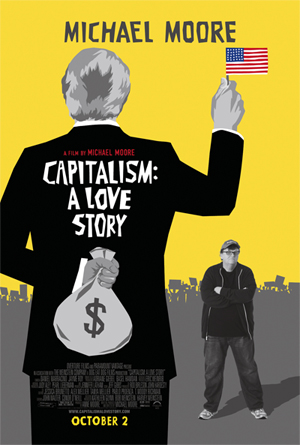 What an opportunity! Cinemas full of people who want to see a film about Capitalism! Think of the possibilities: exposing imperialism – how a comparative handful live at the expense of the rest of the world; demonstrating that for two centuries capitalism has shown itself to be inherently crisis-ridden, and at the root of war and social misery; exposing its apologists and petit-bourgeois opponents.
What an opportunity! Cinemas full of people who want to see a film about Capitalism! Think of the possibilities: exposing imperialism – how a comparative handful live at the expense of the rest of the world; demonstrating that for two centuries capitalism has shown itself to be inherently crisis-ridden, and at the root of war and social misery; exposing its apologists and petit-bourgeois opponents.
Instead, we get an expose of capitalism’s ‘excesses’ while its essentials remain unquestioned. We have the greedy bankers and estate agents, the cruelty of ‘dead peasant’ insurance (company insurance against the death of its employees), poverty struck airline pilots, ‘excessive greed’ and so on. Of course, Moore gives examples of the misery created by capitalism – lousy wages, foreclosures, firings etc. – and we even get an all too brief glimpse of workers’ cooperatives. And, as always, Moore cannot resist engaging in stunts in front of his own camera, including a rather feeble attempt to stage a ‘citizen’s arrest’ of greedy bankers.
But the big, nagging question is ‘Why?’ – why has US capitalism (other capitalisms scarcely get mentioned, and only to point to their supposed superiority) hit the rocks? And why now? The failings, it seems, are not those of capitalism but of human beings. Greed, manipulation, duplicity, lack of regulation – weaknesses of personality and oversight. If only people had more integrity, honesty, compassion and if only the government really represented us, then all, apparently would be well. But how come that these human and State failings have come to the fore at this time? This is never explained: it all seems like something that ‘just happens’. Aw shucks, folks, we made a boo-boo.
There is no real class politics in the film – there are the good ordinary people and the greedy ones. The fact that the crisis is going to intensify, its connection with imperialism, the idea of real class warfare, the need for revolution to survive the crisis – of this, not a whisper.
Moore’s film is nostalgic for a golden age of capitalism, when wages were high, employment was full, America prosperous without any competitors, capitalism was well-regulated and FDR was President. If only, Moore seems to be saying, we could return to those idyllic years, none of this would happen. There is no hint that socialism is the only solution. At the end of the day, the film is a plaintive wail from the old labour aristocracy in the traditional unions – the traditional oh-so constipated so-called labour movement, whose only movement seems to be backwards.
Instead of criticism, we get complaint; instead of explanation, we get exposures of excess; instead of education, we get befuddlement; instead of Capitalism, we get … New Improved Capitalism; instead of socialism, we are offered stale nostalgia.
In his notes for his planned film of Marx’s Capital, the great Soviet film director, Sergei Eisenstein wrote:
‘Capital will be dedicated – officially – to the Second International! They’re sure to be “overjoyed”! For it is hard to conceive of any more devastating attack against social democracy in all its aspects than Capital.’
Eisenstein saw his putative film as an attack on the politics of opportunism, reformism and class collaboration – a revolutionary film. By contrast, Moore’s offering displays ‘the strength and the weakness of that kind of criticism which knows how to judge and condemn the present, but not how to comprehend it.’(Marx, Capital) A seriously missed opportunity.
Steve Palmer




